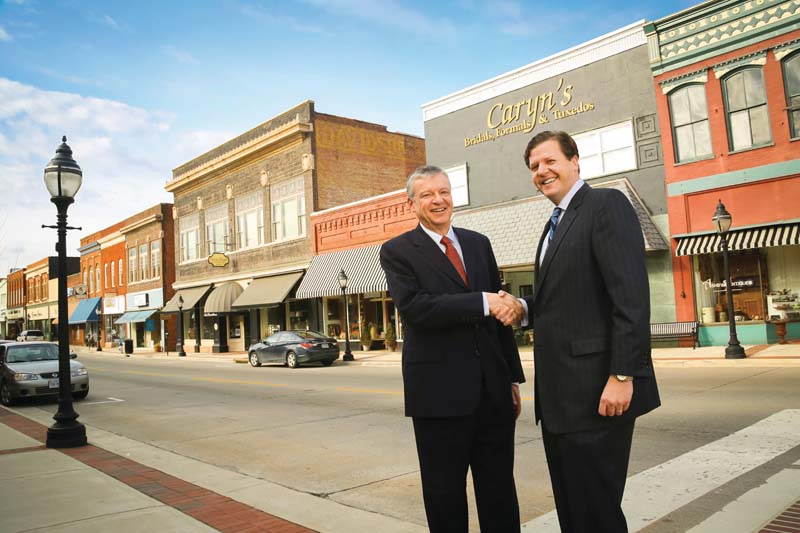
Farmville Mayor David Whitus ’83 (left) and Longwood President W. Taylor Reveley IV believe the town and the university are on the road to a prosperous future.
New spirit of cooperation underlies joint effort by Longwood and Farmville to weave a prosperous future
A great college town is more than just brick facades and lively coffee shops filled with students folded into chairs reading A Farewell To Arms. There’s a feeling in the air—a palpable energy that is equal parts university vigor and town pride. Often you can’t tell where campus ends and town begins.
Longwood and Farmville haven’t quite reached this magical state—a fact freely admitted by town and university officials alike—but there’s a growing sense that it’s achievable. Both university and town seem willing to put in the effort and commitment necessary to weave a common, prosperous future.
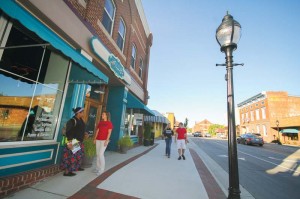
Main Street is home to a wide variety of restaurants, as well as furniture, clothing and gift shops.
“There’s a profound opportunity as one of the oldest two-college towns in the country with a downtown that has such historic bones to take advantage of that richness,” said Longwood President W. Taylor Reveley IV, including in the mix Hampden-Sydney College, which is just a few miles south of downtown. “In five years, if we don’t have a natural flow back and forth between the Longwood campus and downtown, we’ll have missed a real opportunity.”
As the university works on its new master plan, gathering input from Farmville officials and residents along the way, the fabric of the community is being strengthened by a new spirit of cooperation.
“I’ve seen a change in the last year or two in that Longwood wants to get the town’s input while they’re working on projects, not just after they finish something,” said Farmville Town Manager Gerry Spates, who has served in the position for more than four decades. “There’s a perception out there that Longwood’s going to spread out and take over everything, but President Reveley and his staff have gone to great lengths to counter that feeling.”
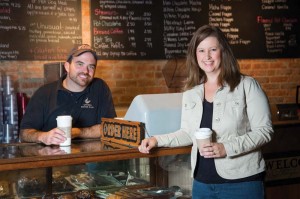
Uptown Coffee Café, opened in 2014 by Jennifer ’00 and Jason Mattox, appeals to the college crowd.
In addition, Reveley’s strategic plan includes an initiative to encourage members of the community to visit campus and engage in university activities. Among the statistics the president reports to the Board of Visitors each quarter is the number of people attending events such as basketball games and Longwood Center for the Visual Arts exhibits and workshops.
Farmville Mayor David Whitus ’83 believes a good relationship with Longwood is critical to the town.
“Building partnerships and bridges to the future is critical, and that’s not just a campaign slogan,” said Whitus. The No. 1 partnership that needs to be built is with Longwood, and I think we have advanced tremendously in that.”
Bottom line: Longwood and Farmville recognize neither can truly succeed without the other.
Good business
In the summer, Farmville is a sleepy town. Traffic is light, lines in stores are short, and the pace of life is a bit slower.
As the heat of August begins to wane, however, all of that changes. More than 4,000 college students flood the town, the pace picks up and lines at cash registers are longer.
“Longwood is without question the economic engine that drives this area,” said Whitus. “We are very aware of that. It’s critical to get the students, quite frankly, to spend money in town. But it’s up to us to attract the types of stores and shops that students want to spend money in. That’s the challenge that a group of very smart, driven people are working on, and once we crest that hill, the ties between Farmville and Longwood are going to get even stronger.”
Several of the businesses on Main Street have been successful in attracting students: Red Front Trading Co., owned by Betty Jo Cook ’58 and Bobby Carter, and Pairet’s sell clothing and services students need, and Uptown Coffee Café, owned by Jennifer ’00 and Jason Mattox, has a bustling atmosphere and live music that appeal to a college crowd. Uptown Coffee opened in August 2014, just in time for the fall semester, and immediately drew crowds and rave reviews as a much-needed and welcome addition to town.
Downtown merchants say everyone benefits when students frequent downtown.
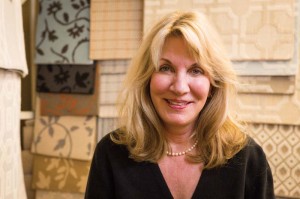
Sandy Henderson ’75, owner of Rug Rats, says there’s a new ‘sense of life’ downtown.
“We definitely feel it when there is a big weekend on campus,” said Sandy Henderson ’75, owner of Rug Rats, a Main Street business. “There’s a difference in the air, a real sense of life.” Indeed, there is an unmistakable increase in movement—a key index tracking foot traffic on campus showed a 37 percent increase in 2014 compared with 2013.
Farmville Downtown Partnership
Another alumna who owns a Main Street business is not only on the main drag—she’s on the front lines of helping to ramp up that town-gown energy.
“It seems like for so long we’ve been separate,” said Caryn Beausoleil Kayton ’79, M.S. ’82, owner of Caryn’s Bridals, Formals and Tuxedos. “But we are bridging that gap.”
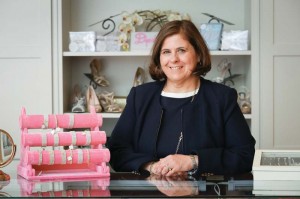
Caryn Beausoleil Kayton ’79, M.S. ’82, owns one of the premier bridal shops in the region and is vice president of the Farmville Downtown Partnership.
Kayton is vice president of Farmville Downtown Partnership, a nonprofit organization dedicated to the strategic revitalization of Main Street. For the last five years, Longwood faculty and staff have served in critical volunteer roles in the organization, further solidifying the growing relationship between the two entities.
“Farmville Downtown Partnership has always had good support from Longwood,” said Helen Person, the organization’s executive director. “For the last few years there’s been a greater emphasis on working in tandem—students have done service learning with us and brought a different perspective.”
Dr. John Miller, assistant professor of English and the president of the group, points to several recent successes as examples of both university and town effort. “A mural, painted by Longwood alum Monty Montgomery ’98, was finished in July 2014 and adorns the brick façade near the Farmers Market,” said Miller. “And the Main Street Music Series, begun three years ago as an open mic night, morphed into a real Thursday night destination in the last year for both town residents and students.”
2014 also saw the debut of the High Bridge Half-Marathon and 5K, which drew nearly 400 runners to town—many of whom attended the inaugural Riverside Festival after the race. Those events were coordinated in part by Longwood biology professor Dr. Amorette Barber.
In particular, Farmville Downtown Partnership has its eye on the economic development of the 100 block of Main Street—where campus meets downtown. “That first block of Main Street is critical to the evolution of downtown Farm-ville,” said Person. “Its future is very much as a pedestrian center, with both Longwood up the hill and several hundred government workers across the street at the courthouse.
Our economic development focus has been on businesses that can exist in that space that will appeal to both students and nonstudents.”
A powerful history
Woven into the fabric of Farmville is history: The town is central to the two great upheavals of the last two centuries, and Longwood is uniquely positioned geographically between the two. At one end of campus, Confederate Gen. Robert E. Lee held one of his last conferences with commanding officers on High Street, while the Moton Museum, the birthplace of the student-led civil rights movement, sits at the opposite
end of campus.
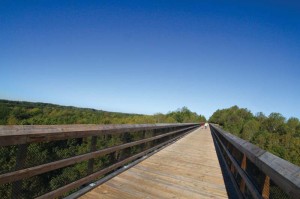
The historic High Bridge Trail, offering expansive views from the bridge itself, is accessible from downtown. More than 200,000 people visited the trail last year.
It was not until recently that the town and university began to harness that power. With the 2009 opening of
the High Bridge Trail—the site of one of the last battles of the Civil War—to biking and recreation, the completion of stunning Moton Museum galleries in 2013 and the ongoing Longwood-Moton affiliation, opportunities for visitors to experience all the town and university have to offer have been greatly enhanced. The trail has been a successful draw for tourism as well as a welcome aspect of Farmville for students. Last year set a record for visitors: More than 203,000 people enjoyed High Bridge’s stunning views.
“This stretch of earth has been central to many of the epochal times in American history,” said Reveley. “That can be one of those things that weaves a college town together, where the community feels a sense of common purpose through that shared history.”
Once the affiliation with Moton is final, Reveley said, the university will build academic programs around that remarkable history and give Longwood students a practical sense of what citizen leadership means.
“In the last five years, Moton has seen significant growth in both visitors and scholarship,” said Justin Reid, associate director for museum operations. “There’s renewed, national interest in Farmville area history. Harnessing and mobilizing Longwood’s resources can help us reach broader audiences, especially K-12 educators and students.”
Being neighborly
Matt King, founder and president of Walk2Campus Properties, was checking out Midwest colleges for potential business opportunities a few years back, when he came to a campus with a river through the middle of it. “I stood on a bridge and watched dozens of college kids with inner tubes walking down right from their dorms,” he said. “And I immediately thought of the High Bridge Trail and access to the Appomattox River and what that could mean for Longwood students.”
For many students, Walk2Campus is the link between Longwood and Farmville. The business owns dozens of properties rented to students, making them part of the neighborhood and the town, not just in name but in spirit. King has put a great emphasis on maintaining the appearance of the properties and making sure his tenants understand they are part of a larger community.
Nearly a decade ago, King and his partners identified Farm-ville and Longwood as the perfect place to grow, but now they see more opportunity. They closed on the the Farmers Cooperative building on Third Street in August and are planning to transform the historic tobacco building into loft apartments geared not to students but to professionals.
What does King see when he looks at Farmville?
Simply put, it’s what he’s always seen. “There’s that fabric that exists where the community is touching the university, and they’re connecting in a way that creates something that’s really compelling,” he said.
King and others believe Farmville and Longwood are well on the way to realizing their combined potential.
“The hallmark of a college town in full cry,” said Reveley, is that if you just get in the car and go there, there’s going to be something to do. There’s a density of activity to the place. Farmville is getting to that point.”
By: Matthew McWilliams
